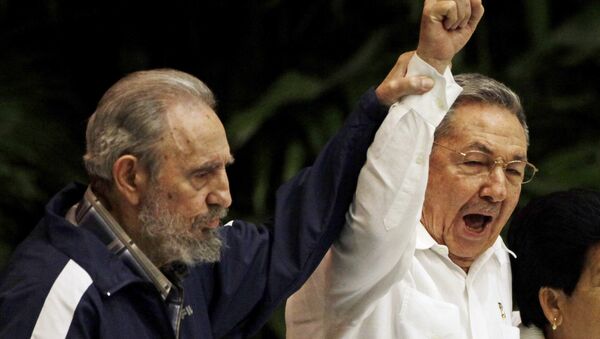In an interview with RT, Boris Martynov, Deputy Director of the Moscow-based Institute for Latin American Studies, said that as far as the Cuba-US ties are concerned, Washington should first and foremost lift its economic embargo against Cuba which has been in place since 1961.
"The restoration of diplomatic relations [between Washington and Havana] is a formal step. It was made by Barack Obama who just needed to improve his political image against the background of his colorless presidency. The serious dialogue is yet to be launched," Martynov said.
Professor Sergey Sudakov of the Academy of Military Sciences, for his part, told RT that the Cuban people are too tired from the sanctions and the oppression of the American government, and that the Cubans do not trust US politicians.
"Right now, neither [US President-elect Donald] Trump nor other possible presidents will manage to prod Cuba to go the way that they want to. As for Russia, it has a good chance [to do so], Sudakov said.
Sudakov, for his part, said that "with all power in Cuba currently in the hands of Raul Castro, he will not allow American interests and American investments to quickly penetrate into his country."
"So the policy of detente will be greatly constrained by Raul Castro, and the relations between Cuba and the United States will most likely be frozen in the next five years," Sudakov said, adding that the Cubans will be afraid of making drastic changes all at once.
In contrast, Earl Rasmussen, Vice President of the Washington-based Eurasia Center, told RIA Novosti that he believes the US and Cuba have good opportunities to further normalize bilateral relations after Fidel Castro's death.
"I think that it is possible to continue the policy of stabilization and a full-fledged normalization of [Cuban-US] relations. In addition, Cuba's strategically important step to open itself to the world can pave the way for more openness and economic growth for all the Cubans inside the country and the region as a whole," Rasmussen said.
According to him, "Fidel Castro will be missed by many, but his death could open new opportunities for the Cuban people."
Opinion: Fidel #Castro dies, but spirit lasts https://t.co/vU1vl4jxmw pic.twitter.com/gX3HJA14Vr
— China Xinhua News (@XHNews) 27 ноября 2016 г.
Meanwhile, some experts say that if 85-year-old Raul Castro's health allows him to be at the helm another five years, he will be able to prevent Cuba from going through political upheavals and provide an evolutionary transition of power.
In this vein, finding a worthy successor remains a key priority for Raul Castro, according to experts.
Boris Martynov in turn said that "since the late 1970s, various presidential candidates have appeared and disappeared, and that against the background of such charismatic figures as Fidel and Raul, all these candidates, of course, were losing in advance."
On Saturday, Vladimir Putin called Cuban President Raul Castro to express condolences on behalf of the Russian people and himself after the death of Fidel Castro.
Putin described the deceased as a "remarkable political figure, a patriot" and praised him for his contribution to a friendship and strategic cooperation between Cuba and Russia.





